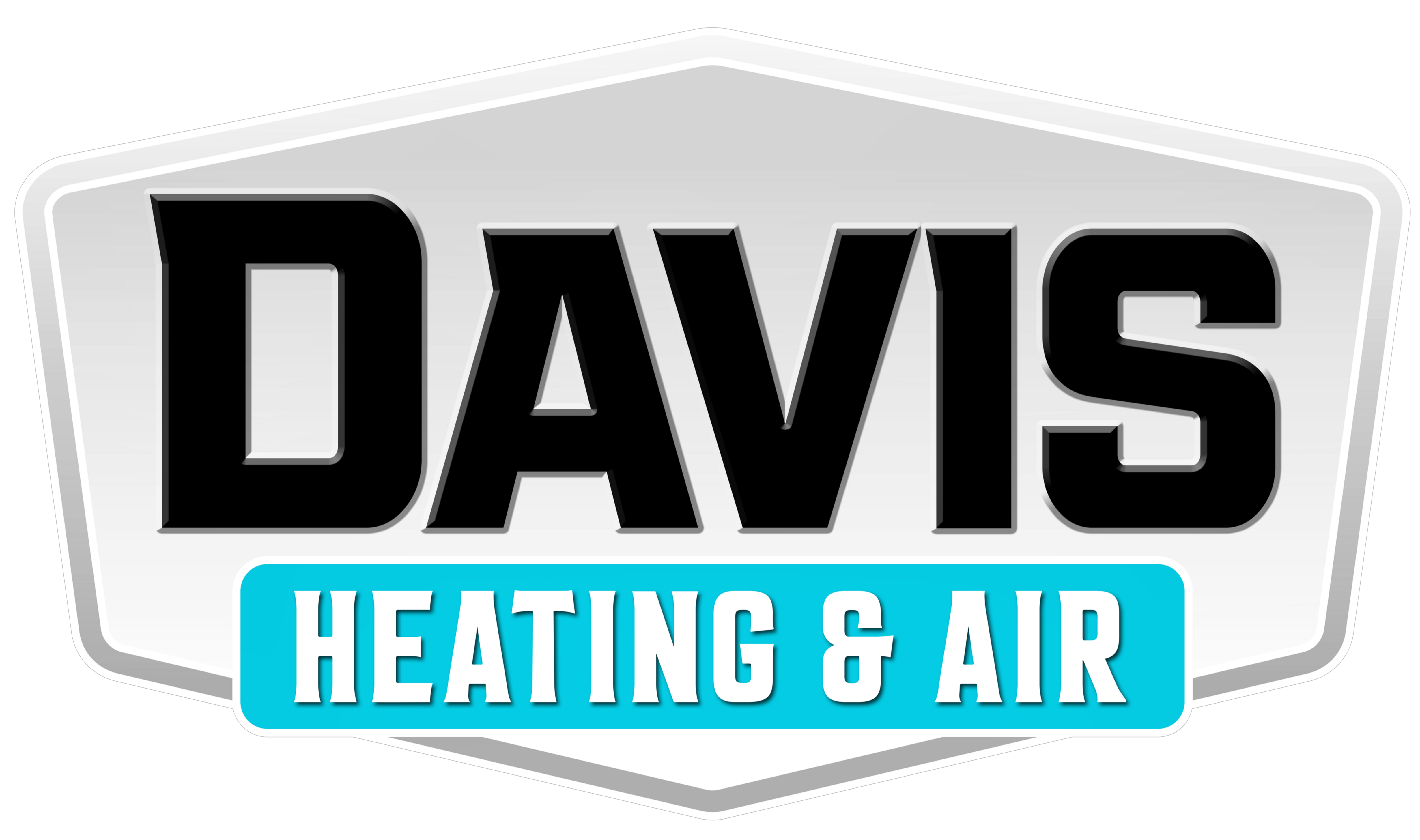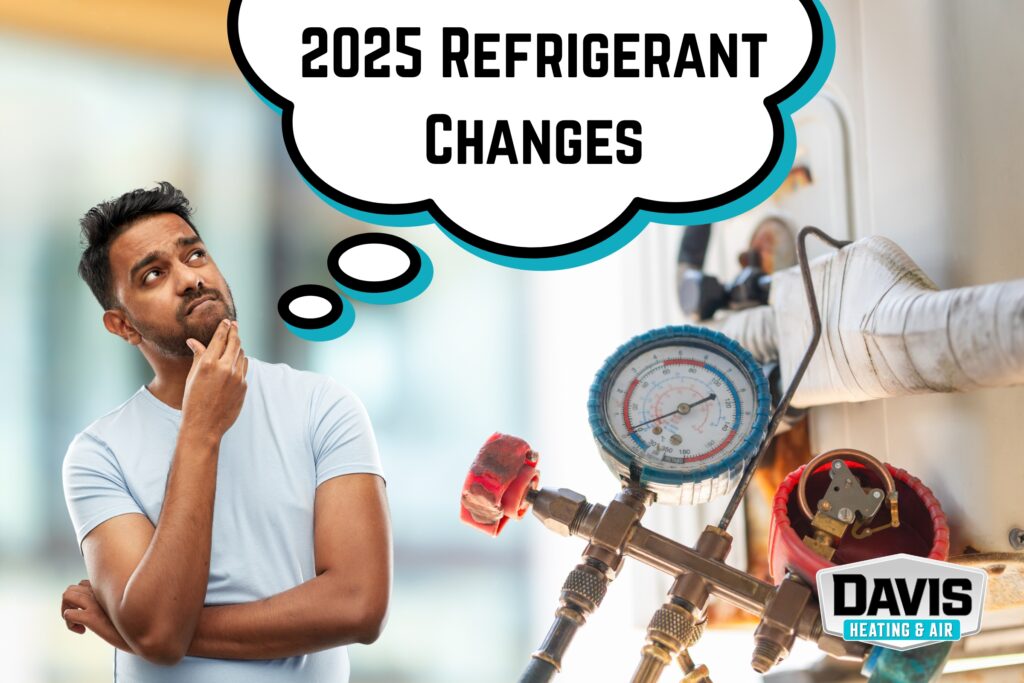As of January 1, 2025, significant changes in HVAC refrigerant regulations have taken effect. These regulations for the HVAC industry are outlined in the American Innovation and Manufacturing (AIM) Act of 2020, impacting homeowners across the United States, including those in Burlington County and Camden County, NJ. The Environmental Protection Agency (EPA) has mandated the phase-out of R-410A refrigerant in favor of more environmentally friendly alternatives like R-454B and R-32.
Whether you’re considering getting a new AC installation or you have an older unit, you might wonder how these changes affect you. Here, the experts at Davis Heating & Air explain what you need to know about the refrigerant change.
What Is the 2025 Refrigerant Change? R-410A vs. R-454B and R-32
The 2025 refrigerant change refers to the EPA’s regulation that all newly manufactured residential and light commercial HVAC systems must use refrigerants with a lower Global Warming Potential (GWP) than R-410A, according to the National Association of Home Builders. This shift aims to reduce greenhouse gas emissions and combat climate change. Consequently, R-410A is being replaced by more sustainable refrigerants such as R-454B and R-32, which offer similar performance with significantly lower environmental impact.
How This Affects Your Current HVAC System
For homeowners with existing HVAC systems using R-410A, there is no change required right now. While the production of new R-410A systems has ended, the refrigerant will still be available for servicing and maintenance purposes. However, as the supply diminishes over time, the cost of R-410A may increase, making repairs more expensive. Additionally, servicing older systems could become more challenging due to the reduced availability of compatible parts and technicians familiar with R-410A systems. Having regular AC tune-ups will ensure your current system continues to work its best.
Key Considerations When Deciding To Upgrade
Do you need to upgrade your HVAC unit now? When deciding whether to get an HVAC upgrade for your NJ home in light of the 2025 refrigerant changes, here are a few factors to consider:
- HVAC cost increase in 2025: The new AC units and heat pumps may have higher upfront installation costs due to advanced technology and compliance with new refrigerant regulations. However, they often offer superior energy efficiency. This translates to lower utility bills over time, potentially offsetting the initial investment. Moreover, as the availability of R-410A decreases, maintenance costs for older systems are expected to rise.
- System age and condition: If your system is over 10 years old or requires frequent AC repair services, investing in a new, energy-efficient HVAC system may be more cost-effective in the long run. Newer systems compatible with R-454B or R-32 can improve efficiency and help avoid the increasing costs of maintaining outdated units.
- Environmental impact: Upgrading to an energy-efficient HVAC system using low-GWP refrigerants can significantly reduce your household’s carbon footprint, contributing to environmental sustainability.
Repair vs. Replace: The Middle Ground
Should I replace my HVAC system or opt for repairs? This is a common question among homeowners. Here are the key considerations:
- When to repair: If your air conditioning unit is less than 10 years old and has been well-maintained, repairing it might be the most economical option, especially if the issues are minor and infrequent.
- When to replace: Frequent breakdowns, escalating repair costs, and decreased efficiency are signs that it may be time for an HVAC replacement for your NJ home. Replacing your system ensures compliance with the latest refrigerant regulations and can provide long-term savings.
- Maintenance importance: Regular maintenance can extend the lifespan of your HVAC equipment, improve efficiency, and help avoid unexpected breakdowns.
Final Thoughts: Should You Upgrade Now or Wait?
The decision to upgrade your HVAC system in response to the 2025 refrigerant changes depends on factors like the age and condition of your current system, environmental considerations, and your budget. Consulting with a trusted HVAC professional like the pros at Davis Heating & Air can provide personalized advice to help you make the best choice for your home.For residents in Burlington County and Camden County, NJ, exploring options for an HVAC replacement NJ or joining a maintenance program like our Davis Comfort Elite plan can ensure your system remains efficient and compliant with new regulations.
Frequently Asked Questions
Will R-410A still be available for repairs after 2025?
Yes, R-410A will still be available for servicing existing systems after 2025. However, its production will cease, and the supply may decrease, leading to potential cost increases for repairs.
Will HVAC systems with R-410A become obsolete after 2025?
No, HVAC systems using R-410A can still operate. However, as R-410A becomes less available and more expensive, maintaining these systems may become more challenging and costly.
How much more expensive will new refrigerant systems be?
New HVAC systems using refrigerants like R-454B and R-32 may have higher upfront costs due to advanced technology and compliance with environmental standards. However, their energy efficiency can lead to lower operating costs over time, potentially offsetting the initial investment and saving you money.
Can I still buy an R-410A system in 2025?
As of January 1, 2025, manufacturers are no longer producing new R-410A systems. However, existing inventory manufactured before this date can still be sold and installed until January 1, 2026. Availability may be limited, so it’s advisable to consult with trusted local HVAC providers regarding current stock.


